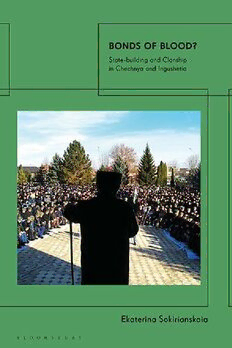
Bonds of Blood?: State-building and Clanship in Chechnya and Ingushetia PDF
281 Pages·2023·4.561 MB·English
Most books are stored in the elastic cloud where traffic is expensive. For this reason, we have a limit on daily download.
Preview Bonds of Blood?: State-building and Clanship in Chechnya and Ingushetia
Description:
The North Caucasus, specifically Chechnya and Ingushetia is a region that has experienced some of the deadliest and most protracted conflicts in Europe. Chechnya is currently a totalitarian enclave within the increasingly authoritarian Russian Federation, while Ingushetia still suffers from lingering political conflicts and chronic problems with the quality of governance. By examining the relationship between state and society, this book considers how state-building has unfolded in a region with highly complex social structures, a history of colonialism, Soviet authoritarianism, and later post-Soviet wars and trauma. Focusing on a systematic analysis of subnational state-building in post-Soviet Chechnya and Ingushetia and the role of teips (clans) in this process, this study responds to the widely accepted academic claim that governance and ethnic consolidation in the North Caucasus are shaped by the politics of teips and the belief that late and uneven modernization, and the survival of tribal structures have been accountable for systematic failures in state-building in the region.The research is based on over 200 interviews which the author carried out in Ingushetia and Chechnya, as well as interviews with Chechen exiled politicians in Europe. The book also features never-before-seen access to the archives of the Chechen Parliament during the period of de facto independence. Through research into the socio-anthropological analysis of the clans and how they function towards political systems, Sokirianskaia shows how the teips lost their traditional organizational structure and roles, becoming incapable of mobilizing for political action. She argues that while teip symbolism has remained politically relevant, and the bonds of kinship are highly important, they do not form the basis of politics and subnational state-building in Chechnya and Ingushetia. Consequently, subnational authoritarianism is not the result of the pre-existing social composition of the society, but a reflection of institutional rules imposed by Moscow.
See more
The list of books you might like
Most books are stored in the elastic cloud where traffic is expensive. For this reason, we have a limit on daily download.
